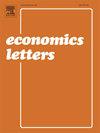模棱两可和赌博的变化
IF 1.8
4区 经济学
Q2 ECONOMICS
引用次数: 0
摘要
埃尔斯伯格悖论表明,人们更喜欢已知概率的赌博,而不是不确定概率的赌博。标准解释通过诉诸萨维奇(1954)的主观预期效用理论来排除风险厌恶,但这种公理性的方法为证据留下了其他解释的空间。我们提供了一个更简单的论点:总方差定律的常规应用表明,二元赌博的收益方差完全由平均概率信念决定,而不是由这些信念的不确定性决定。ellsberg型选择与理性的风险均值方差评估不一致。本文章由计算机程序翻译,如有差异,请以英文原文为准。
Ambiguity and the variance of gambles
Ellsberg’s paradox shows that people prefer gambles with known probabilities to those where they are uncertain. Standard explanations rule out risk aversion by appealing to Savage’s (1954) subjective expected utility theory but this axiomatic approach leaves open other interpretations of the evidence. We provide a simpler argument: a routine application of the law of total variance shows that the variance of the payoff from a binary gamble is determined entirely by the mean probability belief, not by uncertainty about those beliefs. Ellsberg-type choices are not consistent with rational mean–variance evaluations of risk.
求助全文
通过发布文献求助,成功后即可免费获取论文全文。
去求助
来源期刊

Economics Letters
ECONOMICS-
CiteScore
3.20
自引率
5.00%
发文量
348
审稿时长
30 days
期刊介绍:
Many economists today are concerned by the proliferation of journals and the concomitant labyrinth of research to be conquered in order to reach the specific information they require. To combat this tendency, Economics Letters has been conceived and designed outside the realm of the traditional economics journal. As a Letters Journal, it consists of concise communications (letters) that provide a means of rapid and efficient dissemination of new results, models and methods in all fields of economic research.
 求助内容:
求助内容: 应助结果提醒方式:
应助结果提醒方式:


